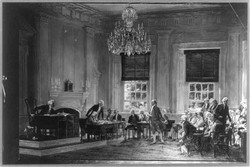John Adams Speech
|
| updated |
Copy Link Code
|
 John Adams was known as an excellent orator with a true conviction for the purpose of liberty and republicanism. The most famous John Adams' speech for independence was at the Continental Congress in 1776 when he successfully defended the case for permanent separation from Great Britain. As opposed to the pessimistic message of some other representatives, Adams declared it a time of hope for a form of government that had never been known in the modern world. Soon after this speech, he was assigned to advise Thomas Jefferson in the drafting of the Declaration of Independence. For his persuasive abilities and political acumen, Adams was sent to France in an effort to secure support for the American Revolution. While he had a number of famous quotes to the foreign ministers he met in Europe, it was John Adams' speeches in America that gave him a leading role in the politics of the nascent United States. Adams was elected to be the first Vice President of the United States and after two terms became the second President of the United States.
John Adams was known as an excellent orator with a true conviction for the purpose of liberty and republicanism. The most famous John Adams' speech for independence was at the Continental Congress in 1776 when he successfully defended the case for permanent separation from Great Britain. As opposed to the pessimistic message of some other representatives, Adams declared it a time of hope for a form of government that had never been known in the modern world. Soon after this speech, he was assigned to advise Thomas Jefferson in the drafting of the Declaration of Independence. For his persuasive abilities and political acumen, Adams was sent to France in an effort to secure support for the American Revolution. While he had a number of famous quotes to the foreign ministers he met in Europe, it was John Adams' speeches in America that gave him a leading role in the politics of the nascent United States. Adams was elected to be the first Vice President of the United States and after two terms became the second President of the United States.
At his inauguration in 1797, John Adams' speech was delivered indoors to an audience of Senators, Congressmen, Cabinet members and Justices of the Supreme Court. It was the first inauguration at which a President was sworn in by the Chief Justice of the Supreme Court. In a lengthy and powerful address, Adams laid out his vision of a proper role for government, including a commitment to public education and declared his love for the Constitution and the rights of the individual states. It was said that many in the audience were brought to tears by Adams' speech; little did they know that he would later confess how nervous he had been before them. In a letter to his wife, Abigail, Adams admitted that he felt as if he were an actor on a stage portraying the role of President and that it was the most difficult scene he had ever acted out.
In his fourth and final annual message (State of the Union address) in November, 1800, Adams gleefully listed the successes of his administration. These successes included a treaty of commerce with Prussia; peace with France after the Quasi-War of 1798; amicable relations with Britain; and the disbanding of the provisional army. At this time, Adams was secure that his popularity and success would grant him a second term as President. Only a month later, however, news would reach him that delegates of the Electoral College were turning towards the Democratic-Republican candidate, Thomas Jefferson, his greatest political rival and former friend. This would be John Adams last speech to members of Congress or any large group of citizens. After his loss in the election of 1800, Adams would retire from politics and retreat to his family home in the newly incorporated town of Quincy, Massachusetts. In 1812, Adams would renew his friendship with Thomas Jefferson and as retired politicians they shared many letters expressing criticism of their successors. In 1825, Adams' son, John Quincy Adams, was inaugurated as the sixth President of the United States. John Adams would pass away one year later on July 4th, 1826, the same afternoon as Thomas Jefferson's death.
